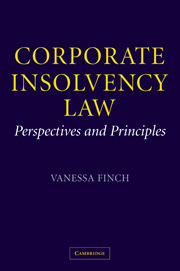Book contents
- Frontmatter
- Contents
- Acknowledgements
- Table of cases
- Table of statutes and other instruments
- List of abbreviations
- Introduction
- Part I Agendas and objectives
- Part II The context of corporate insolvency law: financial and institutional
- Part III The quest for turnaround
- Part IV Gathering and distributing the assets
- Part V The impact of corporate insolvency
- Conclusion
- Bibliography
- Index
Conclusion
Published online by Cambridge University Press: 05 June 2012
- Frontmatter
- Contents
- Acknowledgements
- Table of cases
- Table of statutes and other instruments
- List of abbreviations
- Introduction
- Part I Agendas and objectives
- Part II The context of corporate insolvency law: financial and institutional
- Part III The quest for turnaround
- Part IV Gathering and distributing the assets
- Part V The impact of corporate insolvency
- Conclusion
- Bibliography
- Index
Summary
In some ways corporate insolvency law has come a long way since the Cork Report. Numerous statutes, court decisions and administrative reforms have sought to develop the law so as to remedy deficiencies and secure newly appreciated needs. On the political front, recent years have seen the UK Government showing a renewed desire to attune insolvency laws to the needs of enterprise while, at the same time, avoiding abuses and injustices. In other ways, however, corporate insolvency law can be seen, to date, as an area marked by missed opportunities and modest achievements. It has, first, failed to develop as an organised, consistent and purposeful body of rules and processes. This has been a legal sector in which Cork's prescriptions were cherry-picked and where, subsequently, particular issues have been dealt with piecemeal by both legislators and judges. Corporate insolvency law has, secondly, been developed without close co-ordination with relevant legal sectors and processes. It has not been linked sufficiently closely with company law – in spite of its relevance to the ongoing needs of healthy companies – nor has it been tied in with an analysis of the arrangements for providing finances for companies that are found in the UK. As was made clear in chapter 3, corporate insolvency law is faced with a pattern of corporate funding that is dictated very largely by the legal frameworks that govern the provision of credit, notably those relating to security and quasi-security.
- Type
- Chapter
- Information
- Corporate Insolvency LawPerspectives and Principles, pp. 573 - 579Publisher: Cambridge University PressPrint publication year: 2002



